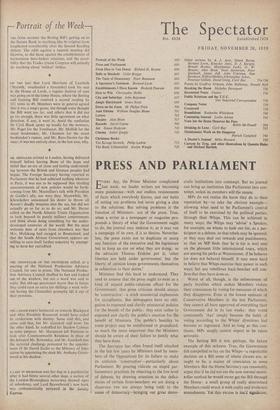—Portrait of the Week— THE ODDS AGAINST the Betting Bill's
getting on to the Statute Book in anything like its original form lengthened considerably after the Second Reading debate. The odds against a summit meeting did likewise, as did those against the establishment of harmonious Sino-Indian relations, and the possi- bility that the Trades Union Congress will actually do anything about 'wildcat' strikes.
ON THE DAY that Lord Morrison of Lambeth (`Strewth,' vouchsafed a bystander) took his seat in the House of Lords, a regular festival of cant was going on in the lower House, where the Betting and Gaming Bill received a second reading by 311 votes to 49. Members were in general agreed that it was a mug's game; but though some thought the Bill went too far, and others that it did not go far enough, there was little agreement on what direction, if any, it went in. Amid the confusion Sir Cyril Black spoke up loudly for the wowsers, Mr. Paget for the Totalisator, Mr. Mellish for the street bookmaker, Mr. Channon for the street bookmaker's runner, and Mr. Rees-Davies for the vicar; it was not entirely clear, in the last case, why.
*
DR. ADENAUER arrived in London, having delivered himself before leaving Bonn of the hope and belief that an era of close and lasting understand- ing between the British and German peoples had begun. The Foreign Secretary having reported to Parliament that he had achieved nothing whatever in Paris, it was not to be supposed that startling announcements of new policies would be forth- coming from Mr. Macmillan's talk with President de Gaulle's ally, nor were they. Meanwhile, Mr. Khrushchev announced his desire to throw all Russia's deadly weapons into the sea, but did not actually go so far as to do so; and Mr. Herter called on the North Atlantic Treaty Organisation to look beyond its purely military commitments and think about doing something for the under- developed countries of the world. But the most welcome item of news from elsewhere was that Mrs. Mafekeng had escaped to Basutoland, and that the South African Government appears un- willing to earn itself further notoriety by attempt- ing to have her extradited.
*
THE CHANCELLOR OF THE EXCHEQUER called, at a meeting of the National Production Advisory Council, for cuts in prices. The National Produc- tion Advisory Council shuffled its feet and looked out of the window, but not a word was said in reply. But old-age pensioners learnt that in future they could earn an extra ten shillings a week with- out having the Chancellor promptly lift it out of their pensions.
*
THE LABOUR PARTY lumbered on towards Blackpool and what President Roosevelt would have called its rendezvous with destiny. Some said this, and some said that, but Mr. Gaitskell said nowt. On the other hand, he reshuffled his Shadow Cabinet to some purpose. Mr. Marquand left Pensions to look after Commonwealth Relations in place of the defeated Mr. Bottomley, and Mr. Gaitskell met the sartorial challenge presented by the appoint- ment of Sir David Eccles to the Ministry of Edu- cation by appointing the sleek Mr. Anthony Green- wood as his shadow.
* A LADY IN SHOREHAM sent her dog to a psychiatrist after it had bitten several other dogs, a section of the London-Birmingham motorway showed signs of subsidence, and Lord Beaverbrook's new book was enthusiastically reviewed in the Sunday Express.






































































 Previous page
Previous page